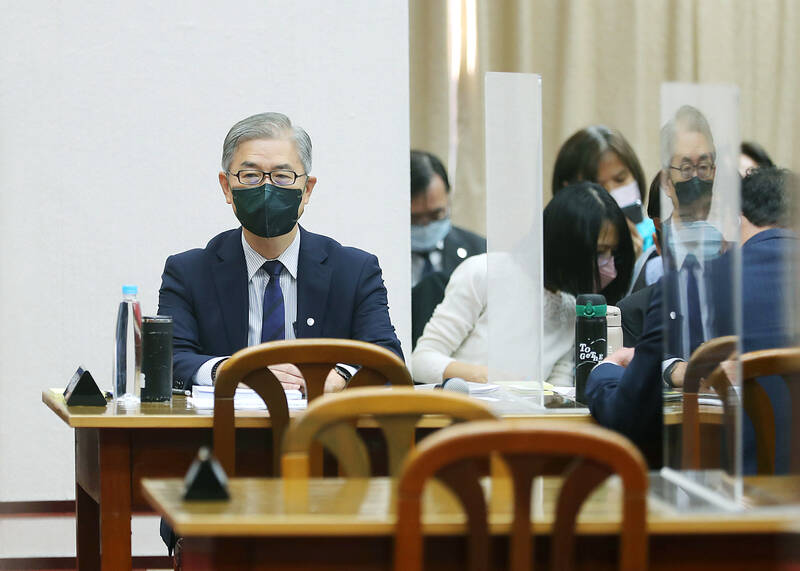Despite the National Development Council’s (NDC) business climate monitor flashing “yellow-blue” for the first time in 26 months, indicating sluggish business, local publicly traded companies still reported revenue growth and showed solid fundamentals, Financial Supervisory Commission (FSC) Chairman Thomas Huang (黃天牧) said yesterday.
Huang’s comment came as investors mulled over whether the FSC would implement the short-selling ban on all local stocks after the TAIEX benchmark index continued its downtrend, falling 1.07 percent to 12,788.42 points.
The commission accounts for the business climate monitor when adjusting its policy, but local companies have operated securely, with combined revenues growing about 10 percent year-on-year for the first three quarters, Huang said.

Photo: CNA
The average yield of local stocks stands at 5.34 percent and the price-earnings ratio tallied 9.4, suggesting that the fundamentals of local stocks are strong, he added.
FSC data show that the monetary valuation of all local and foreign shares held by local financial sectors plunged to NT$2.6 trillion (US$80.88 billion) at the end of last month, down 16 percent from NT$3.1 trillion a month earlier,.
Local banks were the biggest share sellers, off-loading NT$136.5 billion of local shares last month, while local brokerages sold about NT$3.7 billion of local shares, the commission’s data showed.
Only local life insurance companies bought more local shares last month. The combined valuation of local shares held by local life insurers dropped to NT$1.59 trillion at the end of last month, the lowest in 30 months, the commission’s data showed.
Turnover in local stocks totaled NT$172.7 billion yesterday, while foreign institutional investors sold a net NT$11.85 billion of local shares, with weighted stocks such as Taiwan Semiconductor Manufacturing Co (台積電), MediaTek Inc (聯發科) and Evergreen Marine Corp (長榮海運) suffering the brunt, Taiwan Stock Exchange data showed.
Foreign institutional investors sold a net NT$10.4 billion of local shares this week, much less than NT$50.24 billion a week earlier, the data showed.

‘SWASTICAR’: Tesla CEO Elon Musk’s close association with Donald Trump has prompted opponents to brand him a ‘Nazi’ and resulted in a dramatic drop in sales Demonstrators descended on Tesla Inc dealerships across the US, and in Europe and Canada on Saturday to protest company chief Elon Musk, who has amassed extraordinary power as a top adviser to US President Donald Trump. Waving signs with messages such as “Musk is stealing our money” and “Reclaim our country,” the protests largely took place peacefully following fiery episodes of vandalism on Tesla vehicles, dealerships and other facilities in recent weeks that US officials have denounced as terrorism. Hundreds rallied on Saturday outside the Tesla dealership in Manhattan. Some blasted Musk, the world’s richest man, while others demanded the shuttering of his

ADVERSARIES: The new list includes 11 entities in China and one in Taiwan, which is a local branch of Chinese cloud computing firm Inspur Group The US added dozens of entities to a trade blacklist on Tuesday, the US Department of Commerce said, in part to disrupt Beijing’s artificial intelligence (AI) and advanced computing capabilities. The action affects 80 entities from countries including China, the United Arab Emirates and Iran, with the commerce department citing their “activities contrary to US national security and foreign policy.” Those added to the “entity list” are restricted from obtaining US items and technologies without government authorization. “We will not allow adversaries to exploit American technology to bolster their own militaries and threaten American lives,” US Secretary of Commerce Howard Lutnick said. The entities

Minister of Finance Chuang Tsui-yun (莊翠雲) yesterday told lawmakers that she “would not speculate,” but a “response plan” has been prepared in case Taiwan is targeted by US President Donald Trump’s reciprocal tariffs, which are to be announced on Wednesday next week. The Trump administration, including US Secretary of the Treasury Scott Bessent, has said that much of the proposed reciprocal tariffs would focus on the 15 countries that have the highest trade surpluses with the US. Bessent has referred to those countries as the “dirty 15,” but has not named them. Last year, Taiwan’s US$73.9 billion trade surplus with the US

Prices of gasoline and diesel products at domestic gas stations are to fall NT$0.2 and NT$0.1 per liter respectively this week, even though international crude oil prices rose last week, CPC Corp, Taiwan (台灣中油) and Formosa Petrochemical Corp (台塑石化) said yesterday. International crude oil prices continued rising last week, as the US Energy Information Administration reported a larger-than-expected drop in US commercial crude oil inventories, CPC said in a statement. Based on the company’s floating oil price formula, the cost of crude oil rose 2.38 percent last week from a week earlier, it said. News that US President Donald Trump plans a “secondary